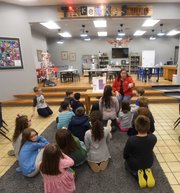Editor’s note: This region is experiencing a large increase in the types of schools and learning approaches available. The Northwest Arkansas Democrat-Gazette explores those different options and their impact on the education landscape in a seven-part series that began Sunday.
Web watch
See this and previous stories at nwaonline.com
Private school enrollment
Northwest Arkansas’ five largest private schools, by enrollment:
• Shiloh Christian School, Springdale: 876, prekindergarten through 12th grade.
• Life Way Christian School, Centerton: 580, prekindergarten through 12th grade
• Providence Classical Christian Academy, Rogers: 529, kindergarten through 12th grade
• Fayetteville Montessori School: 425, preschool through sixth grade
• The New School, Fayetteville: 420, preschool through ninth grade
Source: Arkansas Department of Education
The private school sector continues to expand in Northwest Arkansas despite increased competition from public schools, including charter schools, that mimics some of their education models.
The New School in Fayetteville has announced a large expansion. Supporters of Catholic schools are raising money for a high school and have hired a principal to help organize. Fayetteville Montessori continues to expand as well. A new private school, the Thaden School, is set to open in the fall of 2017 near downtown Bentonville.
Enrollment in the largest 10 private schools of Benton and Washington counties grew by more than 10 percent between fall 2014 and fall 2016, according to figures from the Arkansas Department of Education. Enrollment in the area’s public schools rose 4.6 percent in the same time period, according to department numbers.
The department’s latest available figures put total 2016 enrollment in private schools in Benton and Washington counties at 5,045, or about 6 percent of the 84,671 enrollment in public schools there.
To date, private education has complimented the region’s public school system, said Laura Kellams, Northwest Arkansas director of Arkansas Advocates for Children and Families. Arkansas Advocates is a nonprofit, nonpartisan and secular organization that tracks and promotes the well-being of the state’s children. The organization is known as a strong supporter of public education.
“Public schools have been the region’s highest priority and investment. We expect it will remain that way,” Kellams said.
Private schools offer needed alternatives, but providing an equal and excellent public school experience is still a core value of the region’s culture, she said.
“The mountain communities of the South are different from the flatland South, in that it’s more egalitarian,” Kellams said. “The rich kids go to school with the poor kids. I just hope as we grow, that we remain mindful of that and value it as something special. In the most divided communities in America, students aren’t exposed to others from different backgrounds and circumstances. That is something we should value.”
So far, private schools in the region have willingly offered scholarships and other avenues to students of differing backgrounds, Kellams said. Officials with the Thaden School, which is backed by the Walton Family Foundation, have said they will index tuition rate from $500 to $24,800 per year depending on each family’s resources.
The state imposes no requirements for accreditation, registration, licensing or other approval for private schools. The state Department of Education does track enrollment in each grade level and monitors compliance when a private school opts to participate in a federal program, such as assistance to students in poverty. The state also monitors and enforces health and safety requirements.
Some of the attractions to private schools are obvious: a religious aspect not available in public schools or an alternative to a traditional education setting. Then there are the advantages of a smaller school with greater personalization. Other important reasons are cultural, administrators said.
“The whole world comes here. People coming to work at Tyson, J.B. Hunt or Wal-Mart would come to Northwest Arkansas from a background in private education,” said Greg Jones, superintendent of Shiloh Christian Schools in Springdale. “They’ve been going to private schools in their family for generations, and they want that for their kids.”
Jones has a background in public education and called the public schools of Northwest Arkansas the best in the state. But Shiloh offers “mission and personalization,” he said. The religious school can include a Christian emphasis that a public school cannot and maintains rigorous academic standards, he said.
Private schools in Northwest Arkansas that release their ACT scores show results near public schools in the area. Shiloh didn’t respond to a request for scores in September.
Among private schools that did publicize their scores, Providence Classical Christian Academy in Rogers showed a comprehensive average ACT of 26.7 for graduates in 2016. That was just below Haas Hall Academy, the highest-scoring school in the region. Fayetteville Christian Schools showed an average of 21.5 compared to Fayetteville High School’s 23.8.
Academic rigor attracts families to Catholic schools, said Venell Brown, superintendent of Catholic Schools of Arkansas.
“Only 4 percent of Arkan- sans are Catholic, but 25 percent of our students are non- Catholic,” she said.
Nationwide, Catholic schools have surveyed the parents and students and found that the academic emphasis is a large factor in their choice, along with safety and the faith-based curriculum.
Going from a private school to a public one, no matter how good the public school is, would jar students used to a smaller private school, Jones said.
“We have an assimilation process. Because of the transient nature of employment in this area, with people moving in and out of corporate offices, we have 60 to 70 new students every year in grades 6 through 12,” he said.
These students are put in “family groups” of 10 to 12 students who are all assigned to an adult mentor. The welcoming approach and the close bonds it forms, plus the region’s overall appeal, means many of the parents and children who come here are later reluctant to leave, he said.
“It’s like one parent told me, ‘We came here kicking and screaming, and now we’re going to leave here kicking and screaming,’” Jones said.
Dennis Chapman, president and head of school for the New School in Fayetteville, chuckled at Jones’ “kicking and screaming” story.
“We hear that a lot,” he said.
The New School emphasizes problem solving and creativity in its curriculum. The same factor drives the success of both public and private schools in Northwest Arkansas: People who live here value education, he said.
“Part of it is the incredible growth in the region, so there’s plenty of students to teach,” Chapman said. “But people here know that no one option for education, however good it is, is going to be right for everybody. Our school got started by people who realized there were not enough options, particularly in Fayetteville.”
The New School has students working with circuit boards and other such components at an early age, all with a “tinkering,” hands-on approach.
“Not everyone learns well in a classroom listening to a lecture,” Chapman said. “Those who do very well in that environment would probably not come here and do well, either.”
Another important factor in private school growth is the relative affluence of the region, said Patrick Wolf, who is a distinguished professor of education policy and 21st Century Endowed Chair in School Choice in the Department of Education Reform at the University of Arkansas.
S h i l o h , fo r exa m pl e, charged $8,640 in standard tuition this year for a secondary student, according to its website. Providence Academy in Rogers charged $4,533 plus $945 in annual fees for a secondary student, it website says.
“The area is economically prosperous. Because of that, people have the resources to support privates schools. Economically it is the most prosperous part of the state,” Wolf said.
Not only do more parents have the resources to pay for private school, but fundraising for major projects like buildings is much easier than elsewhere, he said.
The more affluent leaving public schools for private ones concerns Springdale Superintendent Jim Rollins. He worries about a loss of leadership and a concentration of poor students.
The district’s student population already is composed of 65 percent of children from minority races or ethnicities and of 70 percent of children who are from low-income families.
Having a greater concentration of children in public schools whose circumstances make them more at-risk academically causes the delivery of instruction to change in every class in the district, Rollins said.
He also opposes the expansion of a voucher system that would allow private schools to receive state funding because he thinks it would be unconstitutional.
“If the charter schools or the private schools or anybody else takes all the children and if they can serve them better than the public schools, I’m for them 100 percent,” Rollins said. “If they pick and choose and ask for public dollars to support that selection process, I think that’s very problematic.”
Wolf said research on government-funded school choice so far has found private school voucher programs and charter schools have their clearest positive effects on nonacademic outcomes, including on civic values and community involvement.
He is not surprised by the development of the Thaden School in Bentonville or efforts to establish an independent Catholic high school in Northwest Arkansas. He is active in the Catholic high school efforts.
While most parents generally want safe schools with a strong academic foundation, families have diverse needs and wants in their schools, Wolf said. Some parents will pursue schools with a focus on core academics, while other parents will prefer vocational education or schools emphasizing citizenship and volunteer service.
“A large population of parents are going to be a little different in that special flavor they want of their school,” he said.
Competition between schools is not much of a factor, private school administrators said. Northwest Arkansas is a fertile field for education of any kind, they said. Any alternative that produces good results will thrive here.
“We were watching to see if Haas Hall had any effect on our enrollment, but we haven’t see it yet,” Jones said.
“They have the academic emphasis too and, being a charter school, they didn’t have tuition. So they are the ones on our radar the most. So far, though, there’s been enough growth that there are plenty of students for everyone.”
Haas Hall has campuses in Fayetteville and Bentonville and the state has authorized it to open next fall in Rogers and Springdale.
Wolf agreed the region strongly supports academics, saying it is not surprising considering the long history of the University of Arkansas and its effect on the area.
“University towns tend to have better performing schools because they produce educated people, so as a result you have well educated teachers, for instance,” he said. “The fact that the people in the region graduated from here all reinforces the value of education.”

